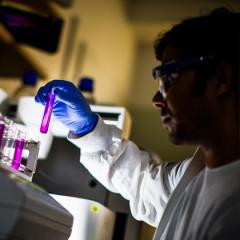
Cutting-edge research at the Australian Institute of Bioengineering and Nanotechnology has won Australia’s most prestigious awards.
Two AIBN researchers, Professor Debra Bernhardt and Professor Lianzhou Wang, have each been awarded an ARC Laureate Fellowship.
“It gives me enormous pleasure to congratulate our recipients of the ARC Laureate Fellowships,” said AIBN Director, Professor Alan Rowan.
“Laureates are one of the most prestigious Australian Fellowships and are extremely competitive with only 17 awarded each year,” he said.
Professor Lianzhou Wang’s ARC Laureate Fellowship will enable him to develop new artificial leaf technology that can use sunlight to capture CO2 and convert it into valuable chemicals and carbon-neutral fuels.
To do this, Professor Wang and his colleagues are developing new semiconductor materials.
A semiconductor material is able to absorb solar energy, and in so doing, the semiconductor becomes so excited that it generates charged particles including negatively charged electrons and positively charged ‘electron holes’.

These charged particles are useful in two important ways, explained Professor Wang. They can be used to create an electric current, such as in the case of solar panels, or they can be used to drive chemical reactions.
One such reaction involves splitting water molecules to produce pure oxygen and hydrogen. The hydrogen can then be used as a fuel to replace fossil fuels.
The charged particles in the semiconductor can also be used to drive chemical reactions that, with the assistance of water, break up CO2 to produce valuable chemicals.
The ARC Laureate Fellowship will enable Professor Wang to use his expertise to design semiconductor nanomaterials with optimal composition, shape, size and functionality in order to achieve this.
The program will lead to the development of next-generation solar fuel and chemical generation technologies based on innovative systems such as wireless artificial leaves that mimic natural photosynthesis.
“If we can successfully use the artificial photosynthesis process to produce valuable hydrocarbons and hydrogen, which can be used as alternative fuels, this will help shift the industry landscape from a fossil fuel consuming process to a renewable energy driven process,” said Professor Wang.
“This would reduce carbon emissions and also increase renewable energy usage.”
Professor Debra Bernhardt’s Laureate Fellowship will allow her to advance her research on non-equilibrium systems.
The new knowledge gained from this work will help scientists understand important processes in physics, chemistry and engineering, including processes that underpin the existence of all biological life.
Moreover, this knowledge will have important applications for a wide variety of materials and technologies.
“Non-equilibrium systems include those that are subject to a change in conditions or force,” said Professor Bernhardt. “All systems we observe are out of equilibrium to some degree, so there’s a huge variety.”
“As a simple example, if you have a system initially at one temperature and it’s cooling down, it is in a non-equilibrium state. Living things, self-assembling systems, chemically reacting systems and explosions are more complicated non-equilibrium systems.”

Equilibrium systems are relatively well understood — they do not change with time and are not subject to a force, for example, which makes them more straightforward.
Non-equilibrium systems are very interesting and important, said Professor Bernhardt, but their dynamics are often much more complex and there is a lot we still don’t know about their behaviour.
“We want to predict what these systems would do under different conditions.”
The ARC Laureate Fellowship will enable Professor Bernhardt to apply and develop statistical physics in an endeavour to obtain new theoretical results.
She will carry out state-of-the-art molecular simulations of non-equilibrium systems to test the results and apply them to problems associated with materials processing and clean energy technologies.


